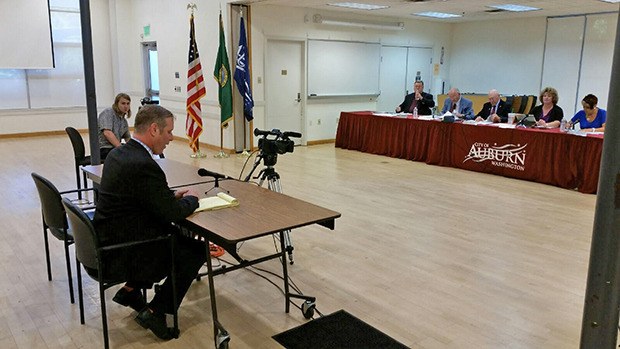By the close of 2016 City leaders expect to have a zoning schema in hand that directs where retail marijuana businesses can and cannot be in Auburn.
Putting an end, in that often-talked-of best-case scenario, to many of the headaches I-502 has visited on Auburn, among them, a lawsuit brought against the City by the owners of Green Solutions Place, a controversial retail marijuana operation that opened on Auburn Way South earlier this year even while a City moratorium against additional pot stores was in place.
Indeed, the ordinance and moratorium the City Council passed Monday is about the lawsuit, and the City buying itself time to create zoning for marijuana operations. And until those designations are in place, the new regulations will have to do.
“The real solution to this is going to be found in zoning, which we’re working on right now,” City Councilman John Holman said before the unanimous vote.
Here’s what the ordinance does:
• Restricts the number of retail pot businesses, producers and processors in Auburn to two, provided that where more have been licensed or have received City permits, those may continue. But should any of those businesses leave or close, it’ll be back to two again.
• Requires the City to create an action plan for Planning Commission and City Council review of ongoing issues related to retail pot businesses. Other changes to the ordinance and other limitations or accommodations for marijuana-related businesses and activities consistent with the plan may come out of the review.
• Limits producers and processors in the City to 90,000 total square feet of space and minimum of 4,000 square feet. Businesses now operating or licensed to operate inside the City that fall under the 4,000-foot minimum can stay open at their initial location. Additional businesses, or business that change location, however, will have to meet the 4,000-square-foot minimum requirement.
•Includes specific reference to statutory and regulatory provisions related to organic solvents. When not used in conformity with required procedures and protocols, use of organic solvents may create hazards.
Green Solutions Place isn’t the only prospective pot shop watching what the City does.
Last October, when KF Industries’ owner Kirk Edwards learned that the Washington State Liquor and Cannabis Board (WSLCB) planned to issue two more retail marijuana licenses in Auburn, in addition to the two allowed via the previous state lottery, he began in haste to remodel a long vacant store at 404 Auburn Way S. But earlier this month, despite having received his license from the WSLCB, he found his plans caught between a City moratorium and the board, which does not recognize moratoria.
“We are looking forward to the process after this passes to see what the planning commission can do,” said Philip Dawdy, one of several consultants working for KF Industries.
Deputy Mayor Largo Wales described all the work that went on behind the scenes to create the new rules.
“This has been an incredible effort on the part of Auburn’s legal department, working with our producers, manufacturers and retail people to address, at this time, some issues as they relate to producers and processors.”
State voters passed I-502 in November 2012, allowing recreational retail marijuana sales.


